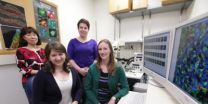(Press-News.org) A non-invasive test that includes detection of the genetic abnormalities related to cancer could significantly improve the effectiveness of colon cancer screening, according to research published by a team of scientists including David Ransohoff, MD, professor of medicine at the UNC School of Medicine and UNC Lineberger Comprehensive Cancer Center member. The large-scale, cross-sectional study was published online today in The New England Journal of Medicine.
The study compared two different types of tests used for screening colorectal cancer: a non-invasive, multitarget stool test that includes DNA markers related to colon cancer along with a test that detects stool blood, versus a commercial fecal immunochemical test (FIT). While the FIT test detects hidden blood in the stool, a potential signal for cancer, the multitarget test also includes genetic mutations in the stool that are related to cancer. In the study of nearly 10,000 participants, the DNA test detected 92 percent of colon cancer, significantly more cancers compared to the 72 percent for the FIT test in asymptomatic participants at average risk for colorectal cancer.
The results from this study could impact screening rates, which remain frustratingly low in the U.S. despite the evidence of their effectiveness.
"Detection of 92 percent of colon cancer is extremely high for a non-invasive test, so that a negative test result means that no further evaluation, like colonoscopy, is needed at that time," said Ransohoff. "Having such a sensitive, non-invasive option could have an important effect on screening rates for colorectal cancer."
While the DNA test appears to be more sensitive than the FIT test, it did produce more false positive results, which would lead to colonoscopy. Further, the study did not address the question of how frequently non-invasive testing might be needed.
Colorectal cancer is the third leading cause of cancer-related deaths in the United States and is expected to cause over 50,000 deaths in 2014, according to the American Cancer Society.
INFORMATION:
In addition to the University of North Carolina, additional institutions involved in the study include Indiana University School of Medicine, Icahn School of Medicine at Mount Sinai, Kaiser Permanente Medical Center, and the Boston Biostatistics Research Foundation. The study was funded by Exact Sciences.
Genetic test could improve colon cancer screening
2014-03-19
ELSE PRESS RELEASES FROM THIS DATE:
Strategies for teaching common core to teens with autism show promise
2014-03-19
Scientists at UNC's Frank Porter Graham Child Development Institute (FPG) report that high school students with autism can learn under Common Core State Standards (CCSS), boosting their prospects for college and employment. Newly published recommendations from FPG's team also provide strategies for educating adolescents with autism under a CCSS curriculum.
"The number of students with autism who enter high school settings continues to grow," said Veronica P. Fleury, lead author and postdoctoral research associate with FPG's Center on Secondary Education for Students with ...
New technique makes LEDs brighter, more resilient
2014-03-19
Researchers from North Carolina State University have developed a new processing technique that makes light emitting diodes (LEDs) brighter and more resilient by coating the semiconductor material gallium nitride (GaN) with a layer of phosphorus-derived acid.
"By coating polar GaN with a self-assembling layer of phosphonic groups, we were able to increase luminescence without increasing energy input," says Stewart Wilkins, a Ph.D. student at NC State and lead author of a paper describing the work. "The phosphonic groups also improve stability, making the GaN less likely ...
Chemo-free treatment a possibility for leukemia/lymphoma
2014-03-19
Patients with terminal forms of leukaemia and lymphoma who have run out of treatment options could soon benefit from a new drug, which not only puts an end to chemotherapy and has virtually no side effects but also improves a patient's life expectancy and quality of life.
It has been described as a breakthrough in cancer treatment by a leading professor in haematology, who presented the findings of the Phase 1 trial at an international conference in New Orleans in December 2013.
Professor Simon Rule, Consultant Haematologist at Plymouth Hospitals NHS Trust and researcher ...
Neuroscience 'used and abused'
2014-03-19
Influential policy-informing 'evidence' that children's brains are irreversibly 'sculpted' by parental care is based on questionable evidence.
The researchers warn that the success that advocates of 'brain-based' parenting have had in influencing government policy could undermine parent-child relationships.
The study identified that although there is a lack of scientific foundation to many of the claims of 'brain-based' parenting, the idea that years 0-3 are neurologically critical is now repeated in policy documents and has been integrated into professional training ...
NRL researchers detect water around a hot Jupiter
2014-03-19
Scientists at the Naval Research Laboratory (NRL) are part of a research team that has detected water vapor in the atmosphere of a planet outside our solar system. The team, including scientists from California Institute of Technology, Harvard-Smithsonian Center for Astrophysics, Pennsylvania State University, and University of Arizona, applied a sophisticated Doppler technique to the infrared to directly detect the planet and demonstrate the presence of water in its atmosphere. The discovery is described in the March 10, 2014 issue of The Astrophysical Journal Letters.
The ...
Vanderbilt diabetes researchers track cells' ability to regenerate
2014-03-19
Vanderbilt University scientists have found evidence that the insulin-secreting beta cells of the pancreas, which are either killed or become dysfunctional in the two main forms of diabetes, have the capacity to regenerate.
The surprising finding, posted online recently by Cell Metabolism, suggests that by understanding how regeneration occurs, scientists one day may be able to stop or reverse the rising tide of diabetes, which currently affects more than 8 percent of the U.S. population.
The study "provides clues to how we might learn what signals promote beta-cell ...
Critical illness increases risk of psychological problems
2014-03-19
Fortunately, more and more people survive critical illnesses and accidents. A new Danish-American survey shows, however, that hospitalisation where the patient has received mechanical ventilation can have serious consequences:
- Of course, the good news is that more and more patients survive critical illness and treatment using ventilators. But at the same time, the bad news is that we have now documented that the ventilator patients have a considerable risk of developing psychological problems.
The first few months after discharge are really critical, says professor ...
Multidisciplinary research team led by Tufts CTSI proposes new model for clinical trials
2014-03-19
BOSTON (March 19, 2014) – Experts across academia, industry and government propose a new method for health care providers to get the right treatments to the right patients at the right time. This new approach, A Proposal for Integrated Efficacy-to-Effectiveness (E2E) Clinical Trials, published in Nature Clinical Pharmacology & Therapeutics, recommends a seamless transition from controlled experiments to real-world comparative effectiveness trials. This continuum will improve the accuracy of treatment selection and better determine how those treatments work on different ...
Lied-to children more likely to cheat and lie
2014-03-19
People lie – we know this. People lie to kids – we know this, too. But what happens next? Do children who've been lied to lie more themselves?
Surprisingly, the question had not been asked experimentally until Chelsea Hays, then an undergraduate student in psychology at the University of California, San Diego, approached professor Leslie Carver with it. Now the pair have a paper out in Developmental Science, suggesting that adult dishonesty does make a difference, and not in a good way.
"As far as we know," said Carver, associate professor of psychology and human development ...
Small step towards growing tissue in the lab
2014-03-19
University of Adelaide mathematicians have devised a method for identifying how cell clusters have formed by analysing an image of the cluster.
Published in the Journal of Theoretical Biology, their mathematical modelling tool will be useful in helping biologists and tissue engineers to move towards growing human tissue such as liver in the laboratory.
"When any tissue or organ develops, the cells have to organise themselves into the correct structure," says Dr Edward Green, researcher in the University's School of Mathematical Sciences. "This self-organisation process ...





